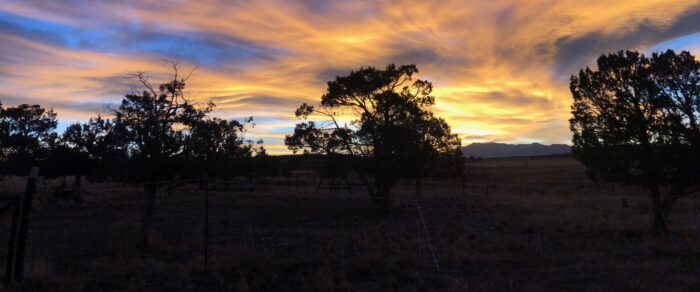Planning for the Future

A beautiful sunrise greeted us one-morning last fall, an omen of good things to come!
Farming is not for the faint of heart and 2020 presented its own unique set of challenges. The logistics of marketing during a pandemic, wondering if we were going to have enough water to see us through the summer, disruptions to our Postal Service (which we rely on to deliver our weekly chicks), and protecting our farm family from the virus, were just a few of the problems we had to cope with.
So much of what we had known to be constant and true was turned upside down and we realized that, in many ways, our world will never be the same again. Yet, times of great disruption can also be opportunities for tremendous change. With this in mind, it is with great hope and a little trepidation that Indian Ridge Farm announces their plan for a 2021 RESET.
Why a “reset”? The short answer is we have some big decisions to make and finding the answers will take time and a lot of creative thinking.
During the past 20 years, we have poured our heart and soul into this farm. Our goal has always been to leave this land better than we found it while providing an opportunity for food security for many in our region. By enhancing food security, we also perform the important task of assuring food sovereignty.
Our focus has been on building soil, conserving wild habitat, managing our water resources, and perhaps, most importantly, mentoring young farmers. One of the things we did not allow time for was to plan for the “end game” or to ask ourselves the question, “What happens to this land when we no longer have the ability and/or the desire to farm?” Like so many of our nation’s farmers, we are now past the age of 60 and, like many of them, our children have chosen vocations other than farming. How to keep this land as farmland and how and to whom we transfer this land is now utmost on our minds.
Finally, looming above it all is the question of climate change and what a prolonged or “forever” drought might look like for this region. In light of drought conditions, what level of food production can we sustain and what are our land-use strategies in response?
We see 2021 as a chance to take the time and space to step away from our regular production to answer these pressing questions. Anne, our co-farmer, will still be growing and selling vegetables through the Norwood Fresh Food HUB, but on a smaller scale. Tony and I will be taking a sabbatical from raising poultry, running a CSA, and mentoring apprentices. We’ll still be right here, raising our food with Anne, resting the land, and crafting a plan for the future of this farm and its inhabitants, both human and wild.
